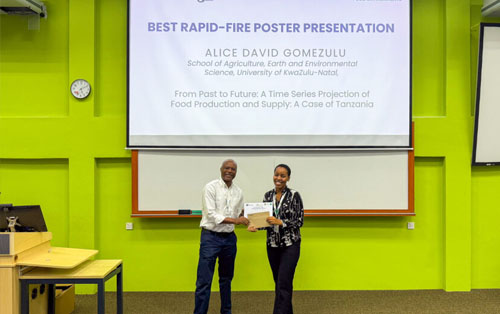The University of Nottingham Malaysia (UNM) hosted the International Symposium on Food Environments (ISFE) 2025 on its Semenyih campus from 21-22 August 2025. The event brought together 91 participants from 13 countries across Asia, Africa, Europe, and Oceania to discuss the future of food environments.
Organised by the Food Environment for Transitioning Economies (FETE) project team at UNM, the symposium was held in partnership with the Centre for Transformative Agricultural and Food Systems, University of KwaZulu-Natal (South Africa), Sokoine University of Agriculture (Tanzania), CSIR-Science, Technology and Policy Research Institute (Ghana), and Thünen Institute of Market Analysis, Germany. The ISFE 2025 was co-organised with SHAPE-Asia (Indonesia, Malaysia, Thailand, the Philippines, Sri Lanka, and Taiwan), and NURTURE-SEA (Malaysia, Indonesia, Thailand, Vietnam, and the Philippines).
The theme “Transcending Disciplines and Sectoral Boundaries to Create Sustainable and Healthy Food Environments,” underscored the event’s multidisciplinary nature, bringing together academics, healthcare professionals, policymakers, non-governmental organisations, and practitioners.
Over two days, participants engaged in keynote talks, nutrition updates, and country spotlight sessions. Professor Anne-Marie Thow from the University of Sydney, Australia and Professor Paul Wilson from the University of Nottingham, UK delivered the keynote lectures. In total, 37 research presentations—16 oral and 21 poster contributions showcased innovative approaches to overcomin disciplinary and sectoral boundaries in creating sustainable and healthy food environments. Many of these presentations were delivered by early-career researchers from the FETE Doctoral Training Partnership (DTP), adding fresh perspectives and enthusiasm into the proceedings.
ISFE participants viewing entries in the poster competition
Best Oral Presentation winner Johnny Osuwu-Arthur (second from left), a doctoral student from the University of Ghana, with Professor Festo Massawe, Dr Johanna Schott, and Dr Daniela Weible (left to right)
The 1-Minute Rapid Fire Presentation proved especially popular, with Alice David Gomezulu (University of KwaZulu-Natal and Sokoine University of Agriculture, Tanzania) winning for her engaging delivery.

Alice David Gomezulu receives the Best Rapid-Fire Presentation prize from Professor Festo Massawe
Beyond the sessions, the symposium created opportunities for strategic discussions on food system transformation. The Research Consensus Panel convened by NURTURE-SEA and the SHAPE-Asia workshop, provided practical insights into stakeholder engagement and resilience-building within food systems. These sessions highlighted the urgency of tackling diet-related diseases and the inequities in the food systems prevalent in many transitioning economies.
The NURTURE-SEA Research Consensus Panel members include Dr Goh Ee Von, Mrs Yasmin Norazharuddin, Professor Nguyen Phuong Le, Dr Sirinya Phulkerd, Professor Poh Bee Koon, Dr Le Thi Thanh Loan, Professor Alex Lechner, Professor Festo Massawe, Miss Olivia Herlinda, Dr Pedcris M. Orencio, Professor Chris Gibbins, and Professor Tapan Kumar Nath
The SHAPE-Asia panel members, comprising Dr Elaine Borazon, Professor Poh Bee Koon, Dr Nisha Arunatilake, Dr Sirinya Phulkerd, and Professor Anne-Marie Thow (from left to right)
A lively group brainstorming session at the SHAPE-Asia workshop, featuring Professor Anne-Marie Thow, Dr Albert Allotey, Dr Peter Noy, Dr Nyabasi Makori, and Dr Geoffrey Adebayo Asalu
ISFE 2025 fostered collaboration across disciplines, sectors and regions. Institutions from Australia, Ghana, South Africa, Tanzania, Malaysia, Germany, the Philippines, Vietnam, Indonesia, and the UK joined representatives from the World Health Organization, the Ministry of Health Malaysia, Khazanah Research Institute, National Institutes of Health, and professional bodies such as the Consumer Association of Penang (CAP), the Malaysia Consumer and Family Economy Association (MACFEA), the Malaysian Dietitians’ Association (MDA), the Malaysian Association for the Study of Obesity (MASO), and the Nutrition Society of Malaysia (NSM). This broad participation helped bridge research, policy, and practice.
The symposium also marked a milestone for the FETE project. Building on earlier initiatives such as the Doctoral Training Partnership (DTP) and the FETE Project Annual Workshop, ISFE2025 concluded a two-month series of engagements. It amplified voices from the Global South, nurtured a new generation of scholars, and laid the foundation for deeper cross-border collaboration.
With plans already underway for a larger convening in 2026, ISFE 2025 demonstrated the impact of dialogue, diverse perspectives, and collective action in shaping the future of food systems.
Posted on 9th October 2025